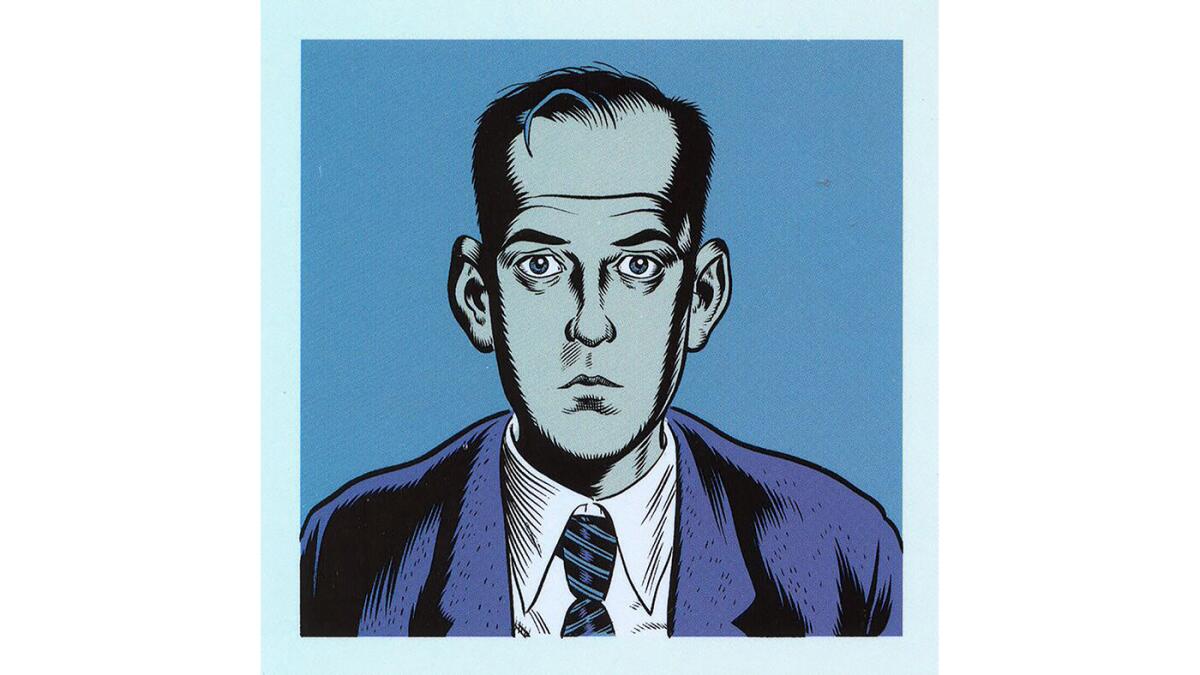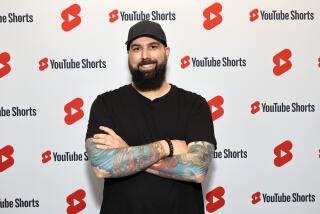Daniel Clowes reflects on his ‘Eightball’ comics’ evolution

Self-portrait of Daniel Clowes, author of the book “Eightball”
When the first issue of Daniel Clowes’ comic book “Eightball” was published in October 1989, Fantagraphics Books printed 3,000 copies, and Clowes was sure it would take about five years to sell them all. He was part of a small wave of upstart young cartoonists pumping out strange little humor pieces for a handful of adults-only anthologies. At the time, the larger popular culture was barely paying serious attention to any comics, let alone to work like his, pitched partway between high art, punk rock and MAD magazine.
Then the 1990s happened. By 1997, when the 18th issue of “Eightball” came out, Clowes estimates his circulation was around 25,000.
The rise of “Eightball” overlapped with the success of other alternative comics like Peter Bagge’s “Hate” and Chris Ware’s “Acme Novelty Library” as well as the dawn of Nirvana, Quentin Tarantino movies and “The Simpsons.” Today, Clowes is one of the most respected of the “literary comics” creators, known for his graphic novels such as “Ghost World” (which was adapted into an acclaimed 2001 indie film).
But he built his following via the eight years of stories and gags that have been collected in the new two-volume, slipcased hardcover book “The Complete Eightball 1-18” (Fantagraphics: 454 pp., $119.99). “I just think there was a moment there, where people outside the comics world opened up to reading comics,” Clowes says. “Maybe it’s that the rest of the culture was so stultifyingly uniform.”
Clowes had no model in mind when he started “Eightball,” beyond wanting the comic “to look like an old issue of ‘Zap’… to have that throwaway feel.” In the early years he’d fill pages with whatever was floating through his head, whether it was the surreal, serialized detective story that would become his graphic novel “Like a Velvet Glove Cast in Iron,” short rants about modern life or raunchy parodies of old “Richie Rich” comics. The important thing for him and for Fantagraphics was to get “Eightball” out three or four times a year.
But, Clowes says, “At a certain point I realized I was cutting corners and doing things that I wasn’t exactly happy with, just to meet a deadline or to be ready for a comics convention. I remember one day thinking, ‘I really don’t need to finish this just for the Dallas Fantasy Fair.’
The second half of “The Complete Eightball” shows how Clowes’ approach started to change. He cut back on the shorter, funnier pieces. (“There’s something really not fun about doing humor,” he admits. “It’s so mechanical. You have to really work on the nuts and bolts of it until it’s not funny to you anymore.”) Instead, he started incorporating some of the ideas that previously would’ve been one-pagers into longer, artier stories — including the elliptical saga of two aloof teenage girls later collected as “Ghost World.”
“I got interested in reading a lot of short fiction. Updike and Cheever and Carver and those guys,” Clowes says. “It felt like a great format for comics, to get in and out in eight or 10 pages.”
Fantagraphics recently announced a Clowes graphic novel called “Patience,” due out next year: an “indescribable psychedelic science-fiction love story” that’ll be his first major new work since the 2010 book “Wilson.” As with “The Complete Eightball” — which bounces between naturalism and wackiness — “Patience” will see Clowes continuing to experiment with his style.
“I’ve never been sure how I want to draw,” he says. “One day I’ll wake up and wonder why I’m even bothering to try and draw realistically and think that my natural way to work is in an exaggerated Will Elder-Jack Davis style. Then I’ll think, no, I’m actually more interested in drawing like Steve Ditko or EC Comics. And then I’ll shift over to Charles Schulz.”
Yet he didn’t find revisiting his old “Eightball” work as painful as he expected. “When a certain amount of time passes, you enter what I’d call the post-wince time,” he says, laughing. “The stuff from the last 10 or 15 years is what makes me wince, because I’m close enough that I can still remember thinking that I should’ve redrawn a face and didn’t do it. The comics in this book are a minimum of 17 years old, and I think of them as quaint, charming antiquities.”
Plus, the 54-year-old Clowes says he appreciates how “The Complete Eightball” serves as a record of his youth. The book captures an artist who was creating for a tiny circle of peers and connoisseurs through his first few issues, then grew more ambitious once he discovered that people were paying attention.
“It’s a unique opportunity to be able to analyze yourself and get a sense of who you were,” he says. “And it’s very raw and emotional too, like looking through a photo album of dead loved ones. You immediately remember all the old grudges you had with the people who wrote unflattering letters, and the bad days when things weren’t working out. It all comes back.”
Clowes will be appearing at 6 p.m. June 5 at Meltdown Comics, 7522 Sunset Blvd. Info: meltcomics.com
Murray is a freelance writer from Arkansas who has covered movies, TV, music and comics for the A.V. Club, the Dissolve and Rolling Stone.
More to Read
Sign up for our Book Club newsletter
Get the latest news, events and more from the Los Angeles Times Book Club, and help us get L.A. reading and talking.
You may occasionally receive promotional content from the Los Angeles Times.








